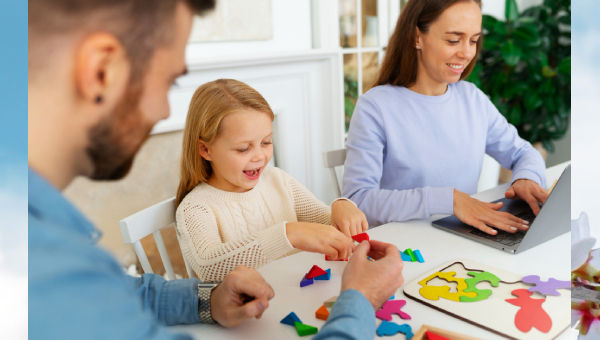Tiny Bites, Mighty Nutrition: Power-Packed Solids for Your Baby
Creative Parenting: Crafting Memories and Lessons Through Play

Welcoming a child into the world is a remarkable experience, marked by celebrations, challenges, and key milestones. During this journey, play becomes one of the most valuable and essential ways to support children's emotional, intellectual, and social development. Through creative parenting – playing yourself – children and parents can forge a special bond while learning important life lessons and useful skills. During periods of play, you can take ordinary life events and frame them within a context of inquiry and a spirit of discovery. This lends itself to deepening your bond and layering in critical lessons, all while making memories that will last a lifetime. In this article, we’ll explore how creative play forges a child’s development, strengthens the parent-child bond and introduces a set of critical life skills that stay with us for years to come.
The Power of Play in Child Development
Play, of course, isn’t just fun. Nor is it merely doing nothing. It’s the work of children – and their most valuable asset. In the play, children experiment with the various ways of being in the world and are challenged cognitively, physically, socially, and emotionally.
- Cognitive Development: Fantasy play is highly supportive of cognitive development. Like all play, imaginary play enhances the development of children’s problem-solving skills, critical thinking, and creativity by stimulating their brains and showing them how to think outside the box. Playing with construction materials, pretending to work different jobs, cooking with imaginary ingredients, rescuing pretend forest animals, driving a little car in a miniature house, and creating a hospital or a play grocery store all get the brain going.
- Physical Development: Outdoor playground activities, such as running, jumping or climbing, improve physical development, though children gain physical benefits from such activities as drawing, dancing, or playing indoor games in the lounge.
- Learning Social and Emotional Skills: The act of playing with others teaches children to share, take turns, and be kind to each other. Co-operative or role-playing games make children better at communicating and solving disputes. Children also learn to cope with competing feelings and embrace failure helping them become more resilient.
Playing as a Bonding Tool
The most important aspect of creative parenting is the bonding process with the child. Play naturally offers a Great Avenue through which bonding occurs between parents and their children as they see the world as the child does.
- Creating Shared Experiences: Playing together creates common memories that both parent and child can treasure. From the time spent building a pillow fort to following the treasure hunt, these can become the building blocks of long-lasting memories for the child and even the parent.
- Develop Trust and Security: one thing parents use to make their children happy and interested in learning about stuff is parent-child play. This develops trust in their children, so they feel secure and that everything is going to work out fine.
- Communication: To encourage open communication, children have an easier time expressing their thoughts, feelings, and concerns when playing. With play, parents can be able to express important issues with their children in playful scenarios to encourage the child to explore sensitive issues such as friendships, fear, or loss.
Teaching Life Lessons through Play
With creative parenting comes countless opportunities to convey important life lessons entertainingly. Teaching tools like play mean that parents can help their children learn responsibility, patience, teamwork, and perseverance without ever having to lecture the child.
- Responsibility: Some responsibility can be developed playfully by simply caring for a pretend pet or by managing a chore chart. Parents may also institute games where kids "earn" rewards by completing tasks, which means teaching responsibility and accountability.
- Patience and Perseverance: Engaging in activities like board games, building projects, or simply waiting for paint to dry helps children develop patience. Moreover, when they face small setbacks during play, such as falling while learning to ride a bike, they learn about perseverance and the significance of not giving up.
- Independence and Confidence: Creative play affords children opportunities to experiment, decide, and take risks without undue fear of failure. As a result, it has allowed independence to establish a sense of self-reliance and build up confidence for months. For example, giving children the lead in setting up a game or designing their craft project encourages them to trust their instincts and have a pride of accomplishment.
- Teamwork and Cooperation: Activities that involve collaboration, like building projects or playing sports, teach children the importance of working together and communicating effectively. Children learn that many of the time, working together gets better results than trying to go it alone.
Creative Expression in Routine Activities
Creative parenting does not demand a glamorous rig or expensive toys. It needs little imagination to transform everyday moments into playful, learning experiences.
- Make Chores Games: Turn your household work into a race, or a challenge. For instance, you can start by timing how fast your kid gathers his toys, or cleaning should resemble the house version of a scavenger hunt. The task now is enjoyable and also trains accountability.
- Storytelling: Share stories while driving, preparing meals, or getting your kid prepared for bedtime. You can make up stories with characters and plot twists together with your child.
- Create DIY Play Projects: Engage your child creatively in DIY craft projects. Build something new out of recycled materials or create homemade board games. All these projects stimulate problem-solving creativity and the satisfaction of creating something from scratch.
Scheduled Family Game Nights
Out of the chaos of daily living, it is easily forgotten to make time to have fun together in front of a family. Scheduling regular family nights where game nights take place creates that togetherness and laughter within the family, ultimately creating memories together. Whether it's old board games card games or interactive video games, this time makes them closer to each other while allowing one opportunity for learning and growth. Play offers an excellent opportunity for families to connect, share laughter, and create cherished memories.
- Scheduled Family Game Nights: Parents can use family game nights to introduce new challenges, celebrate achievements, or unwind together. The crucial aspect is to manage time and remain completely engaged in the present moment.
- Group Projects Collaborative Activities: like constructing a model, preparing a meal, or engaging in a craft project build in children the importance of working together. A model necessitates careful planning, effective communication, and teamwork—all crucial abilities for life. Parents can choose projects that align with their child's interests and age level, encouraging them to take on specific roles or tasks. By working together, families create something tangible that serves as a reminder of their shared effort and creativity.
Creating Memories that Withstand Ages with Play
A positive impact of creative play is that it's something you can hold onto as a parent, and they will remember. This is the time your child will remember way past playtime.
Record Your Gaming Adventures
Capture playtime with either still photographs or video, remembering the time spent was nothing less than a little miracle. Make a memory book or digital scrapbook to look back on over the years. That will create a sense of nostalgia in your child and they will realize the amount of fun they had with home play learning.
Create Rituals Around Play
By scheduling play rituals, you create anticipation and excitement. Whether it be “Saturday Craft Day” or “Evening Storytime,” these traditions build in familiarity and pleasure, these rituals also become treasured memories that children take with them as they grow.
Get Involved and Be Present
The essential element of creating memories with your play is you. Showing up and engaging in his playtime means the world to a child, it tells them they matter. Those shared experiences are the fabric of your relationship and what holds you together through life.
Conclusion
Creative parenting through play creates an infinite number of scopes for growth, bonding, and learning. It would, therefore, help parents design valuable memories and pass across life's essentials to the children by integrating play into everyday life. From cognitive and social development to teaching resilience and independence, play is the perfect medium for helping children enter the world and their place in it. Gather your children, unleash your imagination, and accept the magic of play as a powerful tool for creative parenting.
MUST READ: Parenting in the Digital Age: Keeping Your Kids Safe Online








